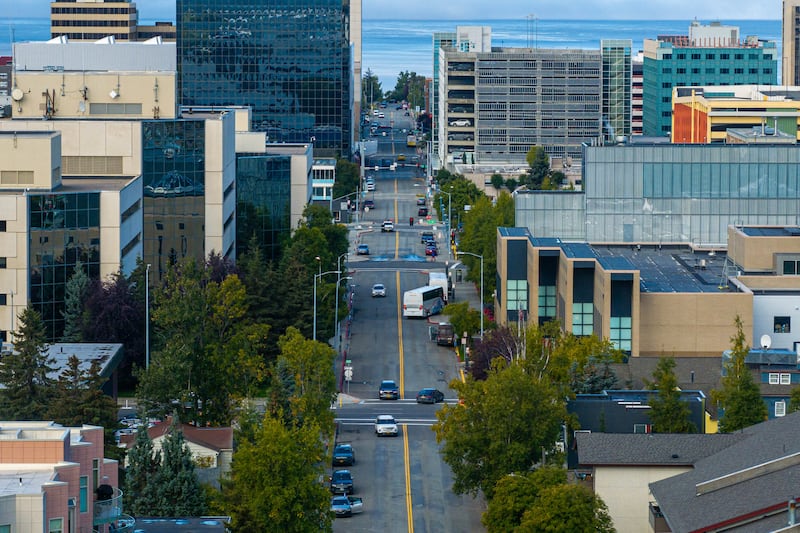 Downtown Anchorage, photographed on Tuesday, Sept. 3, 2024. (Loren Holmes / ADN)
Downtown Anchorage, photographed on Tuesday, Sept. 3, 2024. (Loren Holmes / ADN)
Alaska small-business owners’ financial and economic outlook swung sharply negative this year amid political uncertainty as President Donald Trump sets high tariffs on major trading partners, according to a survey of close to 300 Alaska businesses by a small-business development group.
“Business optimism plunged” and the survey recorded the “highest level of economic pessimism ever recorded” in its eight-year history, according to a statement from the Alaska Small Business Development Center on Thursday.
There’s been a big shift in the economic conditions that Alaska businesses face, said Jon Bittner, the group’s state director, in an interview Friday.
“The largest issue is not specifically the tariffs, but the public uncertainty,” he said. “Businesses don’t know what the pricing will be, how they should market their products, or what to invest in.”
The survey represents businesses across Alaska, in urban and rural areas, and close to every industry sector, Bittner said.
Late last year, about 60% of businesses expected to have good or very good financial conditions this year, the survey found.
By April, only 46% of businesses held that view, the survey found.
“The numbers we are seeing are close to the numbers we saw during COVID,” Bittner said. “But the big difference is there was a lot of federal funding provided to businesses to weather that economic storm. That’s not the case this time.”
Political uncertainty emerged as a top-three challenge facing Alaska businesses, the survey found. Inflation and rising operating costs were also leading concerns. It’s the first time political uncertainty has landed in the top three challenges, according to the center.
The reversal in small-business confidence in Alaska mirrors apprehension among business interests nationwide as the Trump administration sets high tariffs on U.S. trading partners and allies around the world.
The tariffs, some in place and others delayed or adjusted, have caused higher prices and uncertainty for small businesses in Alaska. Many businesses have raised the cost of their goods after their suppliers increased their costs.
[Uncertainty and impacts from Trump’s shifting tariffs hit small businesses in Anchorage]
The survey compares results from a survey late last year of nearly 960 small businesses statewide to an April survey of 273 of those same businesses.
The survey found that 61% of businesses report supplier price increases from the tariffs.
In response to higher supply costs, 48% of the small businesses said they have raised their prices.
Thirty-five percent are attempting to absorb higher costs without raising prices, the survey found.
The businesses expecting a declining financial situation increased from 25% to 63%, the survey found.
Those expecting improvement dropped from 46% to 26%.
That’s an “unprecedented swing” from a positive to a negative outlook, the center said.
Jenna Wright, president of the Anchorage Economic Development Corp., said in an interview Friday that she is not surprised by the survey results.
Her group recently held a business roundtable to hear from several Alaska businesses. She said the business representatives anticipated growth at the year’s start, but now say they’ll be happy with just a flat year.
Wright said the rapid pace of actions from the Trump administration — the on-again, off-again tariffs, the flurry of executive orders, the frozen funding tied to major Biden-era bills — are having ripple effects through the economy.
“All the uncertainty causes businesses to pull back and reassess until they can find what the new point of stability is,” she said.
“I think the concerns are widespread across businesses,” she said.
“But I do want to say that on the other hand, some businesses are excited about the potential for unleashing Alaska’s energy, as it’s been called by Trump administration,“ Wright added. ”So it not all bad, and there are some areas for optimism.”
Bittner said “Alaska is particularly ill-suited” as the tariffs impact global trade, he said.
The state imports nearly all its goods from the Lower 48, while the Ted Stevens Anchorage International Airport, one of the top employers in Anchorage, relies on global trade, he said.
Alaska is also the only state with trucked goods that must come through Canada, which has threatened to impose tolls on Alaska-bound commerce and could do so if the U.S. and Canada got embroiled in an all-out trade war, Bittner said.
